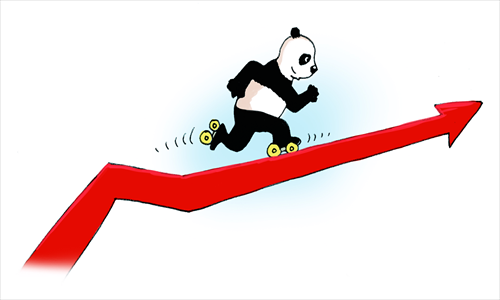European leaders confident in Beijing’s ability to manage economic adjustment

Illustration: Liu Rui/GT
European leaders and economists confident in China institutions, hedge funds, businessmen and ordinary citizens who buy shares and actively participate in stock markets expect to have quicker and higher profits by investing in China than depositing their money in bank accounts.
This is a fair economic logic that might bring tangible results but one which could be also dangerous. Hedge funds often have the ability to get in and out before others defining the market course and leading other investors to either act under pressure or suffer serious losses. It is here that speculation happens and where relevant authorities have to establish an efficient supervision.
The story of the Chinese stock market volatility involves speculative elements reflecting the will to easily earn "hot money." Within this context, prices have been overvalued generating the recent sell-off process. The Chinese government is now facing a serious challenge to act preventively against potential speculation, minimize the risk of rogue-trading and offer a protection network for future investors.
In general, the course of a stock market is also relevant to economic developments within a state. This is arguably the case with China as the country finds itself in a process of transformation and adjustment to the "New Normal" and no longer enjoys the double-digit growth rates of previous years.
Some pessimistic thinkers in the West believe that China is facing a profound crisis that even threatens global financial stability. Politico magazine, for instance, makes a risky historical comparison and draws a parallel between current developments in China and the failures of Spain and France in the 16th and 17th century respectively. On the same wavelength, The Daily Telegraph asserts that the Chinese alarm is not over.
However, apart from some negative media comments, European politicians and economists have confidence in China. German Chancellor Angela Merkel and French President Francois Hollande, for example, recently discussed the fall in Chinese stock market and shared the view that Beijing had the ability to control the situation. Additionally, they focused on the solid nature of the global economy.
In parallel with Merkel and Hollande, the ECB Vice-President Vitor Constancio plays down concerns. He refrains from using the term "crisis" and asserts that the Chinese stock market was not decelerating so much as to justify the rout in the stock market. On the same wavelength, former director of the IMF Fiscal Affairs Department Carlo Cottarelli considers the sharp fall as a "necessary" adjustment.
The confidence shown by European politicians and economists in China is mainly based on two pillars. The first is that the market correction will finally give an end to previous unsustainable rates. And the second is that the slowdown of the Chinese economy is not an unexpected crisis but a rational policy aiming at achieving specific targets.
In the final account, growth rates do not largely divert from official government goals as the transition to the "New Normal" stipulates.
A comprehensive analysis of this concept requires some patience on developments such as the evolution from a command toward a market economy and a conscious liberalization. Even European countries, which enjoy strong trade connections to China and have seen their markets falling, might see less immediate demand of their exports but an increase in the long term.
That is because China seeks to continue market-oriented reforms in order to be able to expand import and external investment in the future and make thus a bigger contribution to the growth of the world economy.
All in all, the slowdown of the Chinese economy can hardly justify concerns and explain the fall of the stock market. Speculation and the necessity to take preventive measures against rogue-trading should not be confused with the natural consequences of the adjustment to the "New Normal."
The author is a lecturer at the European Institute in Nice, France. opinion@globaltimes.com.cn